Jodi in the News
Baby boomers challenged to preserve aging
parents' treasures
from The Jewish Chronicle
By Toby Tabachnick
Adi Rapport's mother, Betty Steinfeld, and
aunt, Ruth Steinfeld, had been living in the same house on Bartlett Street in Squirrel
Hill since 1948.
So, when both women passed away — Betty,
in 2014, and Ruth, this past April — Rapport found herself faced with a house full
of memories taking the form of an enormous amount of stuff. Charged with clearing out
the house, it was hard to know even where to begin.
Read
the full article ...
Designer Insights with Jodi
from the Terrys Fabric's Blog
By Tudor Davies
Jodi Eisner, President of Method to the
Madness, from Pittsburgh, Pennsylvania, has been a professional organizer since 2000 and
received her certification in 2008. In addition, she holds a Master's Degree in Social
Work, from the University of Pittsburgh. Jodi works with clients to help them create a
stress free, uncluttered, systematic space. Each individual has different learning
styles and unique qualities. Jodi assists her clients, by tapping into these styles and
creating a living environment that has functionality and beauty.
We are so happy to bring you the designer
insights of Jodi Eisner.
Read
the full article ...
An Interview with Jodi Eisner of Method to the
Madness
from the In Pursuit of Simple Blog
By Jessica Brown
I'm fascinated by organization and the amazing
benefits we can reap by living more organized, simple lives. I had heard about
professional organizers before, but upon reading an article a few weeks ago about
tactics they use to transform lives, I started to wonder more and more about what it
takes to be a professional organizer, and how they would recommend getting started to
others.
And then I found local professional organizer
Jodi Eisner.
Read
the full article ...
Cleanliness is Next To Godliness
from The Jewish Chronicle
By Stacy Browdie
A common refrain from my husband is, "If
you just put your keys in the same place every time, you'd always know where to find
them." Easier said than done for someone like me. Chaos and clutter have surrounded
me. I have always functioned quite well at my desk amid stacks of papers. The heap of
books, papers, and magazines, sprawling alongside my bed I have navigated willingly. And
I have always been at peace throwing my shoes in a pile at the bottom of my closet, even
though I have to dig them out one at a time each morning. Until recently, that is.
Read
the full article ...
Helping Children Stay Best Organized
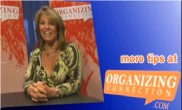
Created for
OrganizingConnection.com
Click here to
view ...
Back to School Tips

KDKA Evening News with
Sonni Abatta
Click here
to view ...
Please Organize my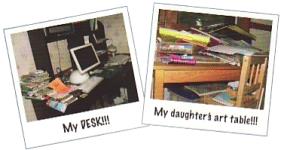 Life
Part 1 Life
Part 1
from North Hills Monthly Magazine
By Hilary Danninhirsch
They must have had spies. Perhaps a web-cam?
How else did the editor of this magazine know to choose me for this awesome assignment?
Did she see my office desk, with piles of
unrelated papers stretching endlessly toward the ceiling?
Did she see the books waiting to be reviewed,
stacked haphazardly under said desk?
Did she see my daughter's art table, smack in
the center of my office, with future masterpieces overflowing the sides and dripping
down to the floor?
In all fairness, I have two little girls.
Clutter comes with the territory. Or at least that's what I tell myself.
But forgetting fairness for now and just
applying honesty, I am not a very organized person. Oh, in my head, I am nothing but
organized. I don't need a calendar to tell me where I have to be. I can recite an entire
summer's worth of play dates, camp and vacation schedules with precision that would
rival anyone's Palm Pilot. But give me tangible items such as school papers, notebooks,
Sunday school registration forms, and I am at a loss.
Maybe my absence of organizational skills dates
back to childhood. When faced with a flaw, blame your mother. My mother has always been
the opposite of a pack rat. Are you done with the Sunday paper? she'd ask at 9:00 on a
Sunday morning, gently extricating the comics from my hands and placing it into the
garbage can before I'd had a chance to see what Nancy and Sluggo were up to that day.
The last thing I did in my own home that
remotely approached organized was when I came up with the brilliant idea to put my
daughters' entire collection of Barbie accessories into a plastic baggie so they
wouldn't get lost in the larger plastic bin containing the dolls and their clothes. I
was very proud of the baggie idea. (Postscript the baggie system lasted for
approximately two days; once again, there are Barbie shoes infiltrating all the crevices
in the playroom.)
My husband has tried for the last nine years to
declutter our lives. He saves and files bills and receipts dating back to the 1860's.
Even so, his battle to turn our office into the orderly Eden of his dreams has been an
uphill one.
Enter Jodi Eisner, savior, and owner of Method
to the Madness, a North Hills based professional organizing service.
When Jodi walked into my house that comfortable
July evening, I steered her directly toward the office. While there were certainly other
areas of the house that could have used the services of a professional organizer (recall
the failed baggie experiment of the playroom) I wanted the office to feel, well,
office-like. Before we renovated our house last summer, the room that I call the office
was the dining room. It still has floral wallpaper and does not look much like an office
(though we did manage to replace the chandelier), but at least I now have office space.
Now if I can only make it feel like one.
Jodi explained at the outset that her role as
an organizer was not to make sure my house stayed neat and tidy (darn!) but to help me
create a system where I could maintain some semblance of order and to use my space more
efficiently. In fact, she said her philosophy is to keep things as simple as possible
for her clients.
When she asked me what I wanted out of my
office, I said, A sanctuary, where I can work in silence and in uncluttered
surroundings. Well, currently there are no doors on my office, so there goes the silence
delusion, but if I can at least rearrange my surroundings so that I know where
everything is at all times, I will be happy.
Jodi, who has a Master's in Social Work, said
that part of her job is changing behavior. She assured me that organization is not about
being rigid.
Jodi said that for her clients, she creates
activity zones where everything has a home. This is especially important to me. For
example, I am truly confused as to what to do when my older daughter brings home random
papers from school. How long do I keep them, and where do they go until they are ready
to be thrown away? What about all of the artwork my children create on a daily basis? Am
I a terrible mother if I toss it in the recycling bin moments after it was painstakingly
created? Am I creating a fire hazard if I don't?
Jodi promised to return in a few weeks to help
me get organized. She said that most clients have the greatest chance for success when
they allow the professional organizer to come into their lives and help them get started
so they don't feel overwhelmed. (I'm all for that.)
In the meantime, she gave me a very simple
shopping list: hanging file folders, manila folders, and several plastic bins. She also
eyed an unused corner of the office, just beneath a bulletin board, where we currently
pile our newspapers for recycling. Could there perhaps be a more effective use of that
space?
One thing I know about stuff is that it never
stops coming, and I need to do something about it before it overtakes my life!
I will keep you posted as to what we
accomplish.
Please Organize My Life Part 2
from North Hills Monthly Magazine
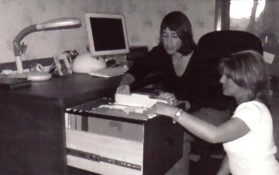 By Hilary Daninhirsch By Hilary Daninhirsch
When the day arrived, I admit I was dreading
it. Maybe there will be an early snowstorm and I can delay everything. This is so
against my nature -- how can spending the afternoon organizing my office be enjoyable?
Earlier in the summer, Jodi Eisner, a
professional organizer and owner of Method to the Madness, came over to give me advice
about how I should reorganize my office so that it didn't take over my life. She marched
in confidently, her head swirling with ideas. I tried to make an invisibility potion ala
Harry Potter, but she immediately spotted me hiding behind a stack of books. Without
delay (despite my best attempts), we got started.
The first thing we did was to remove my
daughters' art desk from the office. My budding artists tends to create at our dinette
table anyway, and the only purpose for the desk was to collect piles of artwork,
coloring books and other art supplies. In an instant the office looked bigger.
I handed Jodi the file folders that she
suggested I buy during her last visit, and we promptly got to work. First, she made me
retrieve a large green garbage bag so that we could go through my stacks of paperwork
and clean house, literally.
After we purged the contents of my office, Jodi
helped me create a filing system. All it took were two file folders, one for my
"stuff" and the other for school.
Jodi suggested I set aside an hour or so one
afternoon per week to go through papers. This idea makes sense, though its obviousness
had escaped me for years. I think this will help me immensely, given that my older
daughter, now a first-grader, brings home numerous papers from school.
The filing method, Jodi explained, has built-in
flexibility. This idea with the system is not for new items to come in and you have to
make them fit into your existing system, but that you can add to the system.
So, what do I do when a new paper finds its way
into my house and I don't have a folder for it? Create a new folder, of course. As Jodi
explained, It's a living, breathing system that changes as your needs change.
Most of what Jodi pointed out to me should have
seemed obvious, but it had never occurred to me that there could be a system where
everything has a place other than in a stack on the corner of my desk.
One of the most important aspects of my new
filing system is the creation of an "action" folder. Rather than filing this
away, the action folder sits on my desk and must be dealt with on a daily basis. Some
items that go in the action folder would be permission slips, party invitations, or
anything that I need to take care of sooner rather than later. This forces me to keep
things flowing in and out of the office.
The very next day, I had an opportunity to see
if I could actually use my system. We received some information from my daughter's
elementary school. Rather than magnetize it to my refrigerator or toss it carelessly on
my desk, I actually opened my brand new filing system and filed it under the category,
Natalie: First Grade. Simple as that!
I also had placed her birthday party
invitations in my "action" folder and lo and behold, I retrieved them and they
got out the door and in the mailbox in a timely fashion.
The biggest issue I face is what to do with my
daughters' artwork. Even Jessica, my four-year old, has become a regular Renoir over the
past several months. The two of them present me with beautiful pictures (using a variety
of mixed media, of course) on an almost daily basis. This is in addition to the art
projects they bring home from first grade and preschool. Although I treasure each
creation, there are only so many I can keep in the house before the fire marshals are
called in to investigate. Plus, the girls have discovered their pictures in the
recycling pile one too many times.
Although we did not set it up yet, Jodi
suggested that my husband Mike and I create a revolving Wall of Fame. Akin to a rotating
art gallery, we plan to find a space in the house where artwork can hang proudly, but
only for a limited time period. Then, the pictures are disposed of and new artwork will
go up. The secret is to have the children get involved in choosing which pieces are
displayed. We also have a storage bin where special pictures can be kept on a long-term
basis.
The flexible system Jodi created for me is
truly something I can live with. It's not going to change me into Miss Efficiency
overnight, but I am now less likely to lose important school forms or other important
papers.
We still have grand plans for the office: my
husband built me a new desk, and eventually, we are going to replace the floral
wallpaper with a rich paint color and we will replace the carpeting.
Could Jodi have changed my life with a few
seemingly simple ideas in four short hours? I hope so, though I wonder if she makes
follow up visits.
A Place for Everything, and Everything in its
Place
from North Hills Monthly Magazine
By Beth Buchwach
Well-organized people can find anything in
their house in 30 seconds or less. For the rest of us, there are New Year's
resolutions. Although no one is born with a messy gene, the tendency to defer
decisions eventually results in mental, physical and calendar clutter.
We've bought the myth that we have to do it
all,says holistic organizing consultant Carol Briney, and this only makes us feel
worse.
Our ancestors prided themselves on knowing
how to prepare for and survive lean times, but as our standard of living skyrockets,
Carol notes, nobody taught us how to live with too much. This is America, you're
allowed to have stuff. The real question is, how do you feel when you walk into your
house? Everything in your house should bring you joy, not stress. If something's
stressing you, it needs to go.
Carol frequently sees frazzled moms,
pampered kids and well-meaning dads who stop trying when they can't live up to their
wives' unrealistic standards. Kids and family members will do what you expect them
to do if you make it simple and fun, she says, adding that she taught her toddler
grandson how to tidy up by taping digital photos of his toys onto low tubs.
Professional organizer Jodi Eisner says
that the kindergarten classroom is an inspirational model for organizing any space
Everything has a place, is easily identifiable and is within reach.
Jodi asks her clients to answer these key
questions: What causes me the most stress when I walk into my home -- piles,
confusion, meal planning, scheduling How can I simplify these parts of my life? How
do I want the different spaces in my home to function?
Sometimes people aren't aware of everything
that they're actually doing in each part of the house, says Jodi. The kitchen, for
example, is usually the hub of the home. It's not just for cooking. It should be set
up to function in a way that fits your lifestyle.
Typically, we spend ninety percent of our
waking hours on repetitive maintenance tasks. When clutter constantly interferes
with daily routines, Jodi says that means we're stressed at least 90 percent of the
time. We also use only 20 percent of our possessions, either because we don't really
need them or we can't easily locate the other 80 percent.
Clutter is when you don't know what you
have, says Carol. Clutter costs us time, money and even affection. Couples argue
about clutter and stop inviting friends to their home because it has become an
embarrassment.
If clutter has taken its toll on you, and
you're ready to fight back, Carol and Jodi offer these basic tips for getting
started:
-
Start in the
most troublesome space, and don't go in there alone. Enlist a friend or
hire an organizing professional for moral support and to keep you
honest.
-
When you've
zeroed in on your target space, empty it. Don't invest in storage
containers until you see the bare space and decide what should go back
into it.
-
Pile, stack or
shovel everything together and then analyze. It'll look like a lot of
junk, and this will allow you to assess the merits of each piece more
objectively.
-
Don't think
about what you spent or saved on any item. If it's still in the bag or
you never use it, that bargain was a mistake.
-
Sort the items
into three categories: keep, discard and donate. Funnel all donations to
one place, if possible. Freecycle websites are an alternative to
time-consuming yard sales. To learn more about freecycling, visit www.freecycle.org.
-
Keep only what
you use, have a purpose for or enjoy. There are no "right
answers" about what to keep, but unless you live in a castle, you
must make choices that will facilitate the wise use of the space you
have. If you can't part with your books, for example, you might choose
to lose your tschotkes. You decide what means the most to you. Limit
memorabilia to a few select treasures.
-
If you use an
item daily, it should be at your fingertips. Other items should go into
deep, deeper and deepest storage, depending on frequency of use and
available space.
-
Consider
off-site storage only if you literally have no room for an item with a
real purpose.
-
Display, honor
and enjoy your collectibles; don't pack them away.
If you backslide after your initial effort,
take heart! Getting organized is a process, not an event. You'll find that
regularly-scheduled maintenance gets easier.
As an added inspiration, Carol's clients
create one "sacred space" in their homes. Nothing goes there ever, except
one thing that you honor and love, she says. When you look at that space, you'll
feel calmed and centered and you know that the rest of your house can look like
that, too.
Pittsburgh Professional Organizers (www.napopittsburgh.org) and area
Curves locations have declared January Get Organized Month. Get details from your
local Curves, where you can attend presentations about getting organized and might
even win an organizing makeover.
Carol Briney can be reached at Universal
Order, (412) 781-8773 and www.universalor.com.
Contact Jodi Eisner at Method to the
Madness, (412) 367-9225 and www.method2themadness.com.
Dirty dishes in the sink, junk mail
covering the kitchen table: If you're not careful, disorganization can take over.
Major changes like a new baby, a promotion, divorce, or a death in the family can
stress you out, causing you to neglect cleaning and home maintenance.
Even daily stress can spur
disorganization, and holiday planning is a major daily stressor in December and
January. But don't worry: With a few organization tips, you'll be on your way to an
orderly home in no time!
Create a stress-busting plan
-
Think
function first. Your kitchen is primarily for cooking; the dining room
or kitchen table for eating, and your living room for living. Before you
bring a piece of mail, a dirty dish, or an appliance into or out of a
room, make sure it's going to the right place!
-
Take small
steps. That pile of disorganized clothing or mail might not be as bad as
you think. Choose a task, and give yourself 15-20 minutes to work on it.
Or, set aside a certain amount of time every day for cleaning and stop
once you've run out of time.
-
Share your
organization strategy. Make sure your family knows where things go. Some
mess is inevitable, but having many helping hands can keep
disorganization to a minimum.
-
Ask
yourself, do you need it? Whether you're making a new purchase, or
deciding what appliances deserve your precious counter space, prioritize
your resources and space for the essentials.
-
Think small:
Gift cards make fabulous gifts,can
be presented in creative ways and don't require much space to
store.
Organizing your kitchen for the holidays 101
Whether you're cooking everything from
scratch or taking advantage of time-saving pre-cooked delicacies, the kitchen is
an essential part of holiday celebration
.
-
Know your
menu. Whether you're hosting a holiday celebration or attending a
potluck with friends, knowing what you're cooking helps you prepare
effectively. Instead of buying groceries you don't need - or forgetting
essential ingredients you can set aside all of your recipes and cooking
aides in advance.
-
Organize
your tasks, and ask others to pitch in. One person to clean, one person
to cook sauces, one person to watch the oven - sound like a dream? With
a little planning, the whole family can get involved in preparing a
delicious meal.
-
Save time,
and add value. Giant Eagle offers an exciting array of holiday side
dishes and entrees, from Brussels sprouts to juicy roasts and fresh
seafood. These heat-and-serve options taste just like homemade, and give
you the freedom to focus on gift-giving, organization, and
entertaining.
Remember: The holiday season is an
exciting time, but the best part of all is spending time with family and loved ones.
Staying organized helps you avoid clutter - and boosts your holiday spirits, too.
Andrew Russell/Tribune-Review
Ornament Storage
Every holiday season brings a breakdown.
No, it isn't when all of the chores or the
credit card bills seem insurmountable or when that can't-miss gift for that special
person falls flat.
No, this breakdown is when it is time to
take apart all of the decorating that has been done and return the home to its
non-festive life.
Organizers, decorators and business owners
all say there are ways of handling it that will create an easier holiday next year
-- and every year.
"Planning is the key," says
Nancy Sakino Spears, an interior decorator from Upper St. Clair, sounding the phrase
that becomes something of a mantra.
These organizers agree the best way of
handling the matter is to store things away in such a planned manner that making
decisions next season is just about unneeded.
Jill Revitsky, owner of the Mt. Lebanon's
Discover Organizing firm and a like-named supply shop, says some devices such as
wreath cases and tree bags are a quick step to safe and reasoned storage.
Most of the ideas seem rather basic, but
perhaps are so simple they are overlooked.
-
Take pictures of successful
decorating you have done, and store the elements for that success together,
says Bob Palermo, founder and owner of Jolly Holly Lights, a decorating firm
from Robinson.
-
Don't be afraid to throw away
things you are not using or do not like anymore, says Carol Briney from
Universal Order, an organizing firm from Aspinwall. It is surprising the
space unwanted stuff takes up.
-
Plastic storage crates are not
popular in the love-of-things-green mentality, but do the job well because
they protect items from water damage, says Jody Adams, owner of the In Its
Place organizing firm from Greensburg.
Having a system matters.
A method and not madness
Plans can make it seem easy. For instance,
Stephanie Tomasic, executive director of Overly's Country Christmas at the
Westmoreland County Fairgrounds near Greensburg, has a way of storing the display's
lights.
She had better. There are 21 million of
them to put away. The lights and extension cords all are wound in the time-tested
"Overly Way." She is unsure of the origin, but positive it works, although
she couldn't really describe it.
She also says another important job is to
check for burned-out bulbs and replace them before storage, to make use next season
easier.
She, and other planners, also remind to
pack items so the first needed are the ones in front.
Revitsky says you may need to rotate items
so material for the next holiday is in the front. That requires a shuffling of goods
at each holiday, she says, but makes any decorating task easier.
Many of the storage savants urge the use
of plastic containers that come in a variety of sizes and sometimes have colors or
colored lids to help identify them.
Jodi Eisner, owner of the Method to the Madness organizing
firm in McCandless, says they are not only protective, but the colors can be
keys such as "here's orange for Halloween and pink for
Easter."
Revitsky says color-coding creates easy
recognition and allows a non-decorator to get the right material simply by
"looking for the red lid."
Rubbermaid Totes , which range from 3 to
50 gallons in size and cost $4.99 to $19.99, often are mentioned for this job.
Lauren Spahr from Rubbermaid says the
containers were not necessarily designed for holiday storage but "we are always
pleased when we get a letter telling us about uses we didn't think of."
Finding the right space
Revitsky also believes in zoning storage,
or keeping items close to the area where they will be used. Outdoor items could be
kept in the garage, she suggests.
That means, of course, finding more than one
space around the house, but it allows those spaces to be smaller.
Spears recommends creativity in space use,
too. For instance, a pole or rod of some kind can be put in unused closet space to
become the home for wreaths. Similarly, hat hooks can be installed to hold bags of
items or extension cords, she adds.
Labels are important when specificity is
demanded, Palermo says. He stores enough lights to fill three tractor trailers, he
says, so labels are necessary to indicate what items are needed for his more than
100 clients. Similarly, if there are lights or decorations needed for a specific
display, he says, label them.
Lists of what goes where and what items
are available also are useful, Spears says. Tomasic says the crews at Overly's make
sure to keep inventories so there are no problems when decorating begins next year.
If belongings are organized and stored in
known positions, space is not wasted, and the decorating job in the future is
easier.
"Make it like shopping," Eisner says, "You
can just go to a spot and pull out exactly what you need."
What to do with the tree?
Christmas trees can do more than hold
lights and ornaments.
The more than 4 billion Christmas trees
growing in the United States provide a great deal of oxygen and, when their days are
done, can be composted into mulch or even made into materials for flood barriers,
tree and recycling experts say.
Recycling programs in this area generally
are run at the municipal level and can be found by contacting local governments.
But Earth911.com, a environmental-awareness firm
headquartered in Arizona, has a comprehensive list of the more than 4,000 recycling
programs in the United States The list is put together for many large cities,
including Pittsburgh.
Rick Dungey, a spokesman for the National
Christmas Tree Association in Missouri, points to the list as a good one. He says
recycling programs have grown to their current level from about 1,000 when he
started with that group about 12 years ago.
Jennifer Berry from the Earth911.com says
this year's list will be the "most comprehensive" one of their efforts and
will be updated by Christmas day.
|


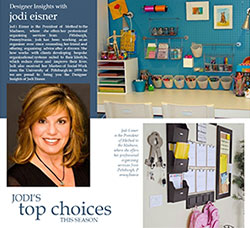
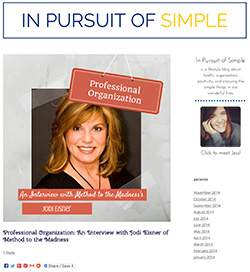







 Life
Part 1
Life
Part 1 By Hilary Daninhirsch
By Hilary Daninhirsch
